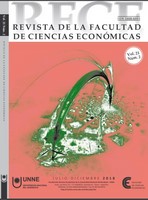Rentabilidad privada de la gestión de residuos sólidos urbanos. Ciudad de Corrientes, Argentina (2010-2020)
DOI:
https://doi.org/10.30972/rfce.0213728Palavras-chave:
gestión integral, residuos sólidos urbanos, recupero, comercialización, sustentabilidadResumo
El problema de los residuos sólidos ha ido cobrando importancia en las ciudades modernas. El avance de la urbanización, vino acompañado de mayor producción de residuos; proliferaron los basurales clandestinos y sitios de disposición final sin los controles de saneamiento requeridos. Existe en ciudades modernas, una forma alternativa de producción basada en la utilización de nuevas técnicas de gestión de residuos; por ejemplo, la adopción de medidas organizativas y operativas que permiten disminuir los desechos hasta alcanzar niveles económicos y técnicamente factibles. (Cardona Gallo, 2006). La ciudad de Corrientes no escapa a esta problemática mundial. Estudios realizados en la región, mencionan entre los mayores problemas ambientales que presentan las ciudades intermedias de las provincias del Nordeste Argentino, la incorrecta gestión de residuos sólidos urbanos (Berent, Mario R. - Vedoya, Daniel E., 2004). Este diagnóstico y el gran desafío que representa la temática, fueron disparadores de esta investigación; cuyo objetivo es evaluar la factibilidad de un modelo aplicable a la ciudad de Corrientes, acorde al crecimiento demográfico previsto para la década 2010 – 2020, y orientado a la recuperación de material susceptible de ser comercializado. Mediante el análisis desagregado de los residuos sólidos urbanos generados y las proyecciones demográficas para el período, se determinó la inversión inicial requerida y los costos de implementación de un sistema GIRSU (Gestión Integral de Residuos Sólidos Urbanos) por parte de la Municipalidad; se estimó el valor monetario de los componentes susceptibles de ser recuperados y comercializados, y se evaluó su impacto en los recursos municipales
Downloads
Publicado
Como Citar
Edição
Seção
Licença
La Revista de la Facultad de Ciencias Económicas solicita sin excepción a los autores una declaración de originalidad de sus trabajos, esperando de este modo su adhesión a normas básicas de ética del trabajo intelectual.
La Revista de la Facultad de Ciencias Económicas de la Universidad Nacional del Nordeste, Argentina, declara e informa que no se aplica a los autores ningún cargo ni costo, por la publicación de los artículos. La distribución y acceso, son de carácter libre y gratuito.
Este obra está bajo una licencia una licencia de Creative Commons Reconocimiento-NoComercial-SinObraDerivada 4.0 Internacional.





